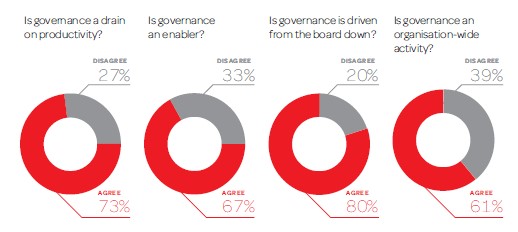Governance: Can you have too much of a good thing?
24 November 2016

In July 2016, Governance Institute of Australia partnered with LexisNexis to conduct a survey of Institute members to capture their views on how governance is perceived in their organisations.
The survey was designed to explore if governance is perceived as a drain on productivity or as a productivity enabler.
The survey found that:
The survey also showed that there is not always a sound understanding in corporate Australia that good corporate governance, when cascaded throughout an entire organisation, enables better and faster decision making with greater clarity around who is responsible for what.
Respondents were sharply divided on this issue, with 49 per cent saying that such an understanding exists, and 51 per cent saying it does not.
The results suggest that governance is now seen as central to business effectiveness and performance. It is generally not viewed as a 'cost centre' or inhibitor of performance, although it appears that in some instances there is a blurring of the line between what is perceived as compliance and what is recognised as governance. They also show that whole-of-organisation governance is not yet seen as essential practice for responsible performance.
This is because while whole-of-organisation governance looks deceptively simple from the outside, we know that it is not. In a recent blog, Helen Burgess, Executive General Manager Corporate Relations & Reputation at NRMA described how she oversees a whole-of-organisation governance framework at NRMA. She makes the point that the organisation operates in an increasingly fluid and disruptive environment where consumer preferences in retail and motoring continually change. It has to be agile and responsive and that means culture, risk profile and the way it performs everyday functions must facilitate those behaviours. Decision-making processes need to be flat and streamlined. Communication and feedback loops need to be fast and efficient. And performance management needs to reward the right achievements.
So we must ask ourselves the question: As the guardians of good governance, how can governance professionals take a leadership role in cascading good governance throughout the organisation in such a way that it will enhance the performance, reputation and culture of the organisation?
How can we secure 100 per cent buy-in from the chief executive; particularly if the chief executive sees governance as a board-only issue or a cost centre offering no tangible benefits?
To explore these issues further, Governance Institute and LexisNexis held a roundtable with industry experts to explore the results in greater detail. The aim was to better understand the implications of the responses and determine what needs to be done to ensure that governance is perceived and executed in such a way that it is, without question, a productivity enabler.
 LexisNexis
LexisNexis

